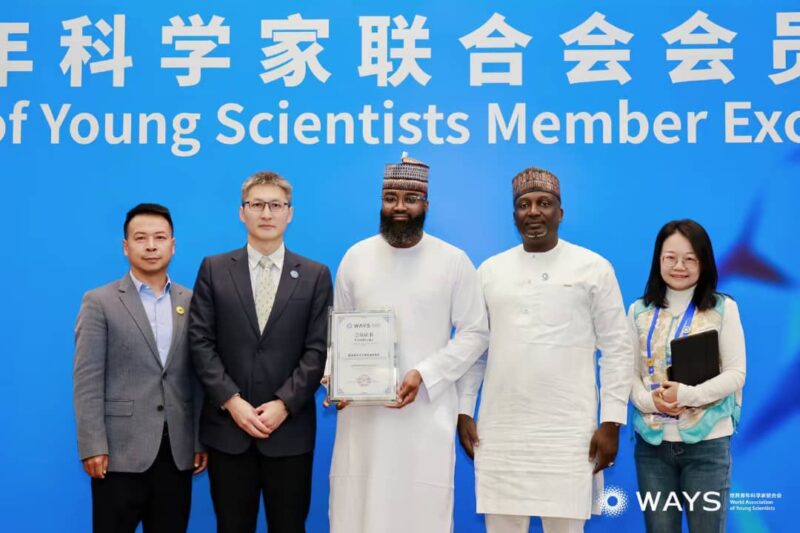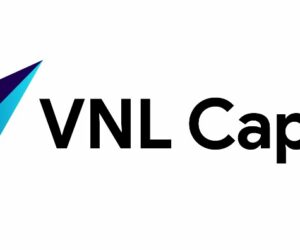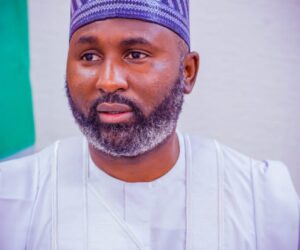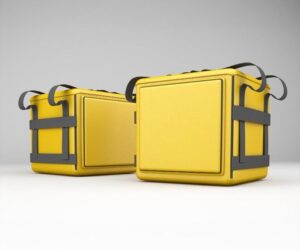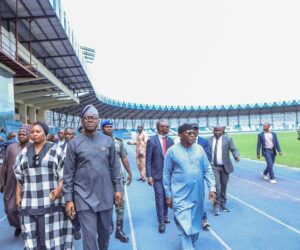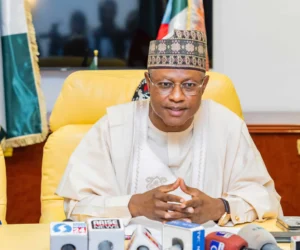In what experts described as a defining moment for Nigeria in the global innovation ecosystem, the National Agency for Science and Engineering Infrastructure (NASENI) has become the first African government agency to be admitted into the World Association of Young Scientists (WAYS), a development that not only celebrates a milestone but also repositions Nigeria as a rising force in global sustainability and technology diplomacy.
The landmark admission, confirmed at the Association’s 2025 annual plenary meeting, in Wenzhou City, Zhejiang Province, China officially places NASENI alongside over 60 national science institutions and research agencies shaping the future of youth-led innovation and cross-border scientific collaboration across the world.
For an Agency that has spent over three decades promoting indigenous engineering and industrial capacity, the move represents both validation and opportunity. NASENI now gains direct access to a global network of young researchers, funding channels, and collaborative platforms that could fasttrack the commercialization of homegrown technologies while providing an international platform for Nigerian innovation.
SPONSOR AD
The World Association of Young Scientists (WAYS) is a non-governmental organization that champions youth-driven solutions to global challenges such as climate change, food security, and sustainable industrialization. Through its summits, exchange programmes, and the prestigious Young Scientist Sustainable Development Goals Award, WAYS serves as a convener and catalyst for cross-border collaboration, encouraging young researchers to develop practical solutions to shared challenges.
NASENI’s inclusion, therefore, is more than symbolic—it reflects a new era in which African institutions are taking their rightful place in shaping the global conversation on innovation, technology, and sustainability.
The Agency’s Executive Vice Chairman/CEO, Mr. Khalil Suleiman Halilu, who also became the first African to serve on the WAYS Board, described the development as a transformative opportunity for Nigeria and the continent.
Speaking at the 2025 WAYS Conference in China, where he delivered a keynote address titled “Nigeria at the Heart of Global Sustainability,” Halilu said NASENI’s growing engagement with international innovation networks shows that the bridge between policy and practice in Nigeria’s science and technology sector is closing faster.
“The bridge between government and private sector is becoming stronger, turning policy into practical outcomes. This is what progress looks like: policy meets innovation, innovation meets people, and people meet opportunity,” Halilu said.
He explained that NASENI’s participation in WAYS reflects Nigeria’s commitment to sustainable industrialization, driven by clean technology, renewable energy, and green manufacturing—all powered by the creativity and energy of Nigerian youths.
“Young Nigerians, your ideas, your energy, and your innovation have a place at the global table. The world is watching what we build next. Let us move together,” he added, drawing applause from delegates representing 60 member countries.
NASENI’s membership of WAYS also speaks to a broader strategy of science diplomacy—using innovation and research collaboration as a tool for advancing national interest. Through WAYS, NASENI will gain access to global best practices, institutional partnerships in Asia, Europe, and the Americas, and opportunities for Nigerian researchers to participate in cutting-edge scientific exchanges.
This development is particularly significant for Nigeria’s industrial diversification agenda, as the country continues to look beyond oil dependency towards knowledge-driven sectors. NASENI’s long-standing work—spanning solar panel manufacturing, hydropower development, agricultural mechanization, and scientific equipment production—has laid the groundwork for what could now become a globalized innovation ecosystem anchored in Nigeria.
For decades, the Agency has been responsible for building local capacity through its network of specialized engineering and research institutes across Nigeria. With this new international recognition, it can now leverage its infrastructure and human capital to attract investments, research grants, and global partnerships that align with Nigeria’s Renewed Hope Agenda and the government’s Green Economy vision.
At the WAYS 2025 conference in China, Halilu emphasized the importance of domestication—adapting imported technology to meet local realities and needs. He argued that for Nigeria to truly benefit from global technological progress, it must prioritize the customization of solutions to fit its environment, economy, and culture.
“It is not enough to import technology. We must adapt it. Domestication is how we make global innovation work for us in Nigeria,” he told participants. This philosophy mirrors NASENI’s long-standing approach to innovation.
Over the years, the Agency has invested in developing technologies that address local challenges—ranging from affordable housing designs and minihydropower systems for rural electrification to the manufacture of precision tools and scientific instruments for schools and industries.
With its new access to WAYS’ vast research ecosystem, NASENI can now integrate these local innovations into global networks for scaling, testing, and commercialization. This will help bridge the long-standing gap between Nigerian prototypes and viable global products.
During his keynote, Halilu also announced the upcoming launch of ZeCo by NASENI, a flagship initiative set for 2026 that will focus on clean mobility, renewable energy systems, and sustainable manufacturing. The programme is expected to drive Nigeria’s ambition to become a regional hub for green innovation and circular economy solutions.
“ZeCo,” derived from “Zero Emissions Collaboration,” aims to unite young engineers, startups, and industries in co-developing technologies that reduce carbon footprints and promote sustainability. “Nigeria’s journey to Net Zero is not just a national agenda. It is a global invitation to collaborate, to co-create, and to build a future that works for everyone,” Halilu said.
Analysts believe this move could position Nigeria as a continental leader in green industrial transformation, especially at a time when climate financing and clean technology investments are gaining momentum worldwide.
Beyond the policy and institutional implications, NASENI’s membership of WAYS opens a new frontier for Nigerian youths in science, technology, and innovation. The platform provides opportunities for training, mentorship, and access to global funding for research and development.
By linking young scientists to international programmes, Nigeria can better address the challenge of brain drain and create incentives for its brightest minds to stay and contribute to national development.
WAYS offers several capacity-building initiatives such as innovation bootcamps, joint research fellowships, and global hackathons focused on the Sustainable Development Goals (SDGs). These will now be accessible to young Nigerians through NASENI’s collaboration framework.
Established in 1992, NASENI was designed to anchor Nigeria’s industrialization efforts by providing the infrastructure for science and engineering innovation. Its mandate covers the development of engineering materials, power systems, agricultural machinery, and scientific tools for education and industry.
Under the leadership of Halilu, the Agency has embarked on a series of reforms and strategic partnerships to modernize its operations and align them with global sustainability goals. From renewable energy projects to digital technology hubs, NASENI is redefining the boundaries of what a government science agency can achieve.
Its ongoing projects include the development of solar cells and panels, small hydropower plants, industrial automation systems, and research in aerospace components. Through its specialized institutes across the country, NASENI is nurturing a new generation of Nigerian engineers capable of competing globally.
One of Nigeria’s long-standing challenges has been the commercialization of research outcomes. While universities and research institutes generate ideas, few make it to the market due to funding gaps and lack of industrial synergy. NASENI’s engagement with WAYS would change that dynamic by providing a pathway from prototype to commercial product.
Through WAYS’s global innovation hubs, Nigerian startups and researchers will have the chance to pitch ideas, form partnerships, and access venture capital. This could help reduce the dependency on imported technologies and strengthen Nigeria’s domestic manufacturing base.
NASENI’s membership is also a win for Nigeria’s global image. It signals that African institutions, when properly structured and visionary, can compete for relevance in shaping the global scientific agenda. It also demonstrates how science and innovation can serve as instruments of diplomacy—building bridges where politics and trade often create barriers.
By sitting on the WAYS Board, Halilu now represents not just NASENI but also the entire African innovation ecosystem, ensuring that the continent’s peculiar developmental challenges are reflected in global research priorities.
At the Wenzhou conference, participants from China, Germany, Brazil, and India commended Nigeria’s proactive approach to integrating science with sustainable development. Delegates noted that NASENI’s emphasis on domestication could become a model for other developing nations seeking to localize global technologies.
The Secretary-General of WAYS, Dr. Meilin Zhang, described NASENI’s membership as “a powerful signal that Africa is ready to co-create solutions, not just consume them.” He added that Nigeria’s growing engagement with global innovation networks would help diversify global knowledge production and promote equity in technology access.
With its entry into WAYS, NASENI has moved beyond being a national institution, it has become an ambassador of African innovation on the global stage. The Agency’s focus on collaboration, sustainability, and local adaptation positions Nigeria as a serious player in the global knowledge economy.
NASENI is positioned to translate these international linkages into tangible outcomes—new technologies, jobs, and industries that improve lives and strengthen Nigeria’s economic resilience. As Halilu puts it, “Progress is not just about innovation; it’s about inclusion. It’s about turning science into solutions that matter for people, for communities, and for the planet.”
IDEAL FOR Civil/Public servants, Engineers, Doctors, Entrepreneurs, IT Experts/Software Developers, Top Bankers and more.

